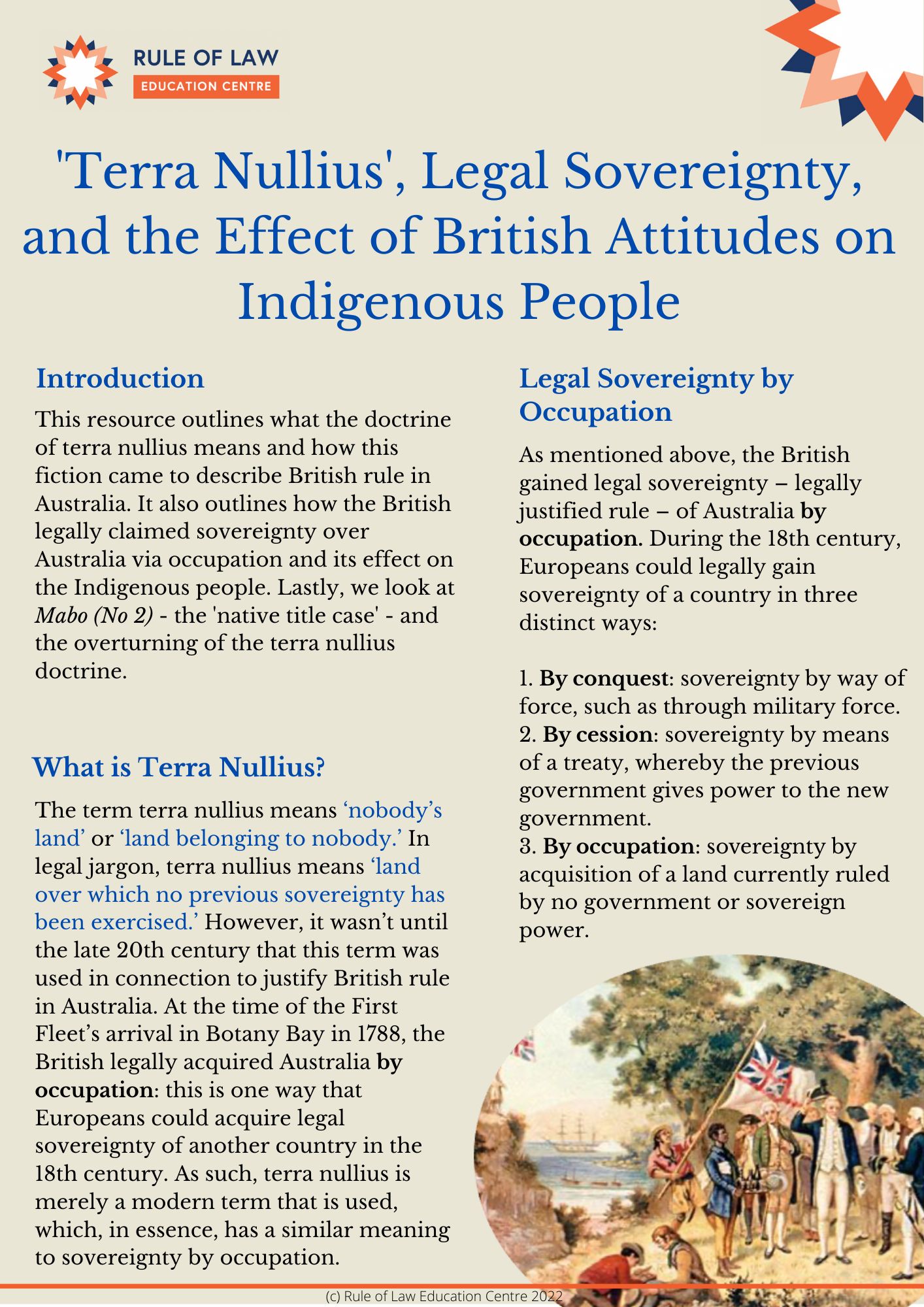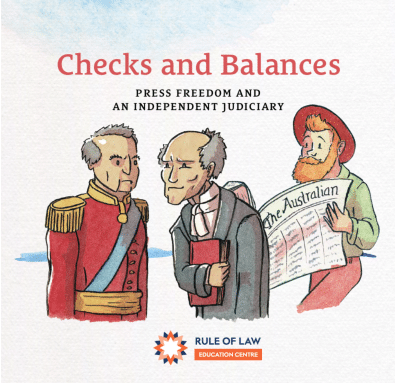European Settlement and Terra Nullius
This resource outlines what the doctrine of terra nullius means and how this fiction came to describe British rule in Australia. It also outlines how the British legally claimed sovereignty over Australia via occupation and its effect on the Indigenous people. Lastly, we look at Mabo (No 2) – the ‘native title case’ – and the overturning of the terra nullius doctrine.
What is terra nullius?
The term terra nullius means ‘nobody’s land’ or ‘land belonging to nobody.’ In legal jargon, terra nullius means ‘land over which no previous sovereignty has been exercised.’
It wasn’t until the late 20th century that the term terra nullius was used in connection to the colonisation of Australia. This term was used in a way which described ideas regarding sovereignty that were already in existence from colonisation.
Video: Understanding Terra Nullius, Native Title and the Wik Case
Interview with Mr Walter Sofronoff KC, a Queensland Barrister who represented the Wik Peoples in the landmark native title case Wik Peoples v Queensland.
Mr Walter Sofronoff KC spoke to us about the origins and definition of Terra Nullius, which is empty land. Terra Nullius was used historically to deny Indigenous claimants rights over any lands.
He then discussed two landmark decisions that established Native Title in Australia, articulating how Terra Nullius was rejected as evidence showed that Indigenous peoples did have governing laws and laws regarding property.
Mr Sofronoff KC shares how he understands native title to work with an example from post-World War II Japan.
Legal Sovereignty
During the 18th century, Europeans could ‘legally’ gain sovereignty of a country in three distinct ways:
1. By conquest: sovereignty by way of force, such as through military force.
2. By cession: sovereignty by means of a treaty, whereby the previous government gives power to the new government.
3. By occupation: sovereignty by acquisition of a land currently ruled by no government or sovereign power (ie terra nullius).
So, how did the British gain sovereignty by occupation in 1788, when the Indigenous people inhabited Australia and had their own customs and lores*?
*Lore = the customs and stories the Indigenous people learned from the Dreamtime, and the traditional knowledge they have passed down through generations.
When setting out on his journey to ‘New Holland’ (today’s Australia), Captain James Cook was given instructions from the British Government to only take possession of the land with the consent of the natives or if it was uninhabited.
Similarly, when Governor Phillip landed in Australia, he was required by King George III to ‘endeavour by every possible means to open an intercourse with the natives, and to conciliate their affections…and if any of our subjects shall wantonly destroy them, or give them unnecessary interruption…it is our will and pleasure that you do cause such offenders to be brought into punishment according to the degree of the offence.’
The intentions of the British Government and what subsequently unfolded in the new colony were starkly different.
This contrast can only be understood by looking through the lens of 18th century British attitudes that assumed the land was unclaimed and unowned because:
1. Agricultural Practices
England had been subject to rigorous agricultural farming and techniques for centuries, and therefore the British attitude held cultivation skills as a hallmark of an established society. They also believed that engaging in agriculture and farming gave property rights to landowners.
When the British landed in Australia, they saw a lack of evidence of farming and inhabitants who were primarily hunters and gatherers, not farmers. Therefore, the British believed that the Indigenous people were not agriculturally advanced, nor had they laid claim to the land through established agricultural practices.
2.‘Thinly inhabited’
When arriving in Botany Bay, Captain Cook noted a sparsely inhabited land. Coming from the highly dense and populated England (much smaller than the expanse of Australia), Captain Cook wrote in his diary that he viewed the new colony as ‘thinly inhabited.’
Captain Cook and his accompanying botanist, Joseph Banks, also imagined that, due to the presumed lack of food or fresh water to sustain anyone successfully in such a harsh environment, the remainder of the land must be ‘totally uninhabited.’
3. Indigenous Lore
During the 18th century in England, the British people had a recognised and well-known legal system with an established hierarchy of courts. English society had a number of highly influential and powerful leaders and an entrenched system of punishment and authority.
Therefore, when the British landed in Australia, the long-established unwritten customs and lores of the Indigenous people were largely ignored or disregarded as not constituting ‘valid’ law. Due to the assumption that there was no form of Indigenous government, the British believed there was no ‘valid’ way to make a treaty with the Indigenous Australians.
So, the British took legal sovereignty over Australia by occupation largely due to their own British attitudes about what an established territory under the control of a sovereign power was meant to look like.
Effect of British Attitudes and Colonisation on Indigenous People

These new laws, brought by strange ‘white’ invaders from another country, differed significantly from the traditional law that Indigenous people were accustomed to.
The Indigenous people did not understand the law and did not know the law at all, and therefore they did not believe it to be good law to follow. This new law was entirely inaccessible to them, and Indigenous people could therefore not seek redress or justice through the British justice system.
Click here to learn more about how the law was applied to Indigenous people in the penal colony.
The British believed that they were allowing the Indigenous Australians to have protections under the law. However, the way in which it was enacted did not allow for equality before the law for all people, and actually further discriminated against and distanced the Indigenous Australians from the new legal system.
Although the Governors were urged by the British Government to treat the native people with goodwill and kindness, ‘tolerance’ of the Indigenous people grew weary and the British failed to afford the Indigenous people with proper respect.
Property rights were established and brutally enforced. Powerful British leaders of the colonies decided the location of their new land and how much they chose to claim for themselves. Inevitably, Indigenous people would cross newly acquired settler’s property, which was now considered unlawful. The crime of trespassing resulted in severe disciplinary action.
Many Indigenous people were also killed because murder was considered a rightful action by the new British convicts while defending their land rights.
Colonial governments established a large police force, consisting of military men and convicts, to split up Indigenous groups and move them on to other places to avoid conflict. The law was inconsistently enforced across the colony- especially where the frontiers were constantly expanding.
Soon, many Indigenous people came to occupy the prisons in the new colony alongside the convicts.
With the influx of British people, came diseases and illnesses such as smallpox and viral infections which spread throughout the new colony. Many Indigenous people died from these unknown diseases and the Indigenous population numbers suffered greatly.
Overturning the Doctrine of Terra Nullius and Native Title Act 1993 (Cth)
As of today the doctrine of terra nullius, and the notion that Australia was uninhabited at the time of English colonisation, has been overturned.
Mabo (No 2) was the 1992 High Court case which legally overturned the terra nullius fiction and recognised the past and continuing connection that Indigenous people have to the land. Mabo (No 2) also led to the creation of the Native Title Act 1993 (Cth) (‘Native Title Act’) in Parliament.
As of today the doctrine of terra nullius, and the notion that Australia was uninhabited at the time of English colonisation, has been overturned.
Mabo (No 2) was the 1992 High Court case which legally overturned the terra nullius fiction and recognised the past and continuing connection that Indigenous people have to the land. Mabo (No 2) also led to the creation of the Native Title Act 1993 (Cth) (‘Native Title Act’) in Parliament.
Other Implications of English Law that came with the First Fleet
In 1788 when the English established the penal colony of New South Wales, it was governed in accordance with English Law.
As written in the Commentaries on the Laws of England by Sir William Blackstone; ‘those who were sent to settled colonies carried English law with them as a birthright…’ The First Charter of Justice, together with the Second Commission of Arthur Phillip provided a justice system based upon English Laws which had developed over many centuries. These English laws contained principles from the Magna Carta, in particular the rule of law, where no-one is above the law and mechanisms to ensure the law is applied equally and fairly.
As seen in the historical examples below, the development of the rule of law in Australia, together with our democratic institutions has not always been perfect and has relied on strong Australians to drive reform and ensure the rights of every Australian are protected. These examples remind us of the key protections that the rule of law offers; equality before the law, independent judiciary, free press and laws made by the people, and how they provide Australians with safety and protection to go about their daily life.
Equality before the law: Protections Provided by English Law
The first civil case in New South Wales was held on 1 July 1788 (Cable v Sinclair [1788] NSW KR 7, Court of Civil Jurisdiction).
In this case, a poor convict couple used the English legal system, established by the First Charter of Justice to sue the mighty ship’s captain for their parcel that was lost in the First Fleet.
This case set the democratic foundations of Australia, that the law must be applied equally and fairly to all, and people should have equal access to the protections provided by the law.
To learn more about the Kables case, click here to go to our page
Free Press and Independent Judiciary with the Establishment of the NSW Supreme Court
On 17 May 1824, Governor Brisbane proclaimed that the NSW Supreme Court with Chief Justice Forbes was open for business.
It was not long before the independent Chief Justice was under pressure from Governor Darling to allow a new law that would restrict the freedom of the press.
Would the Chief Judge bow to pressure from the Governor? Or will he stand up for the rights of those in the colony to have freedom of speech?
To learn more about the Checks and Balances story, click here to go to our page
Freedom to Participate: Eureka Stockade
The Eureka rebellion occurred in Ballarat, Victoria in 1854.
It had a significant impact on the development of democracy in Australia and was a key moment where the people demanded equal and fair treatment and the right to take part in the democratic process.
Following the events at Eureka there were significant reforms in Australia’s electoral process, mining laws and voting rights
To learn more about the development of democracy after Eureka, click here to go to our page




